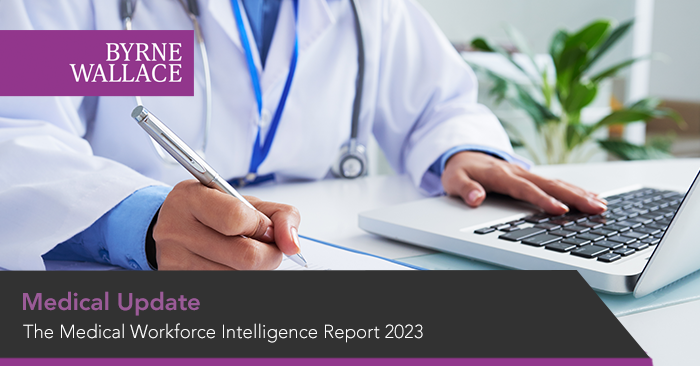The Medical Workforce Intelligence Report 2023
Tuesday, 27 August 2024
On Thursday 15 August, the Medical Council (the “Council”) published its 2023 Medical Workforce Intelligence Report (the “Report”). The Report analyses data provided by doctors who completed the Medical Council’s annual retention process in 2023.
We have outlined below some of the key findings of the Report:
Demographic Findings
It was noted that there were 19,328 clinically active doctors working in Ireland with 7.6% of that total number practicing both within Ireland and outside of Ireland. Of this amount, there was an almost equal split in relation to their self-reported roles; Consultants were at 25.6%, General Practitioner’s at 23.7%, Non-Consultant Hospital Doctors in training at 21% and Non-Consultant Hospital Doctors not in training at 22.2%. Those that self – reported as specialists were at 3.5%.
A total of 60.6% of the clinically active doctors hold an Irish qualification, and more than 25.7% attained a qualification from outside of Ireland, EU and the UK. The top three countries of qualification for international graduates is Pakistan, Sudan, and the United Kingdom.
Challenges Facing Non-Consultant Hospital Doctors
A number of challenges facing Non-Consultant Hospital Doctors (“NCHDs”) was also outlined in the report. These include the following:
- An excess of NCHDs not in training in comparison to specialists.
- An urgent need to improve the NCHD experience and work life balance. The majority of NCHDs are made up of International Medical Graduates not training. Reform of work conditions, training and progression opportunities is needed to ensure NCHDs are supported and later retained in the Irish Health Services.
- The majority of NCHDs not in training are doctors who have trained overseas, many of which have not been able to access specialist training in Ireland. This is a pattern that has remained unchanged in recent years.
- NCHDs are more likely to work an excess amount of hours in comparison to other doctor cohorts, with data indicating almost 30% of NCHDs not in training working more than 48 hours a week.
Reliance on International Medical Graduates (“IMGs”)
It was also outlined in the report that Ireland has a “high reliance” on International Medical Graduates (“IMGs”) and has the fourth highest proportion of foreign educated doctors within the Organisation for Economic Co-Operation and Development (the “OECD”) member states.
The data collected indicates that just under 40% of the clinically active workforce in Ireland have an ‘international qualification’ which is defined as a basic medical qualification obtained abroad. The proportion of doctors qualified in the EU or UK has remained stable, whilst the proportion whom qualify outside of the EU and UK has increased by 2.4%.
Workforce Specialities and Challenges
The report also indicates that a substantial amount of the Irish General Practitioners (“GPs”) workforce is close to retirement age and that women constitute a high proportion of the force.
The report suggests that there is an urgent need for effective action to tackle Ireland’s shortage of GPs and that increasing pressure on GPs is as a result of a number of factors such as a growing and aging population, increased patient multi-morbidity, GP retirement, poor morale and burnout.
Hospital Consultants
According to the report, hospital consultants working in both public and private funded services were most likely to work in excess of 48 hours a week. Those working in private services had the highest percentage of doctors aged 55 and over, however, this is a feature observed across hospital consultants in all service categories.
Importantly, the report outlines that Consultant posts are not being adequately filled and this impacts the quality of supervision and training for trainee and junior doctors across the board.
Conclusion
The Council in publishing this data are ensuring there is a clear and informative update for the public of the Irish health services operating today. In turn, this information will aid future recruitment and retention strategies, medical education, training developments and health policy in Ireland, supporting an effective and strong medical workforce.
It is hoped that the robust data contained in the report can support effective planning for a strong and sustainable medical workforce that can provide safe, high quality sustainable patient care into the future.
You can access the latest Medical Council’s Workforce Intelligence Report 2023 here.
For more information, please contact Partner Eoin McGlinchey or Solicitor Kavi Abbi from our Litigation and Dispute Resolution Team.

